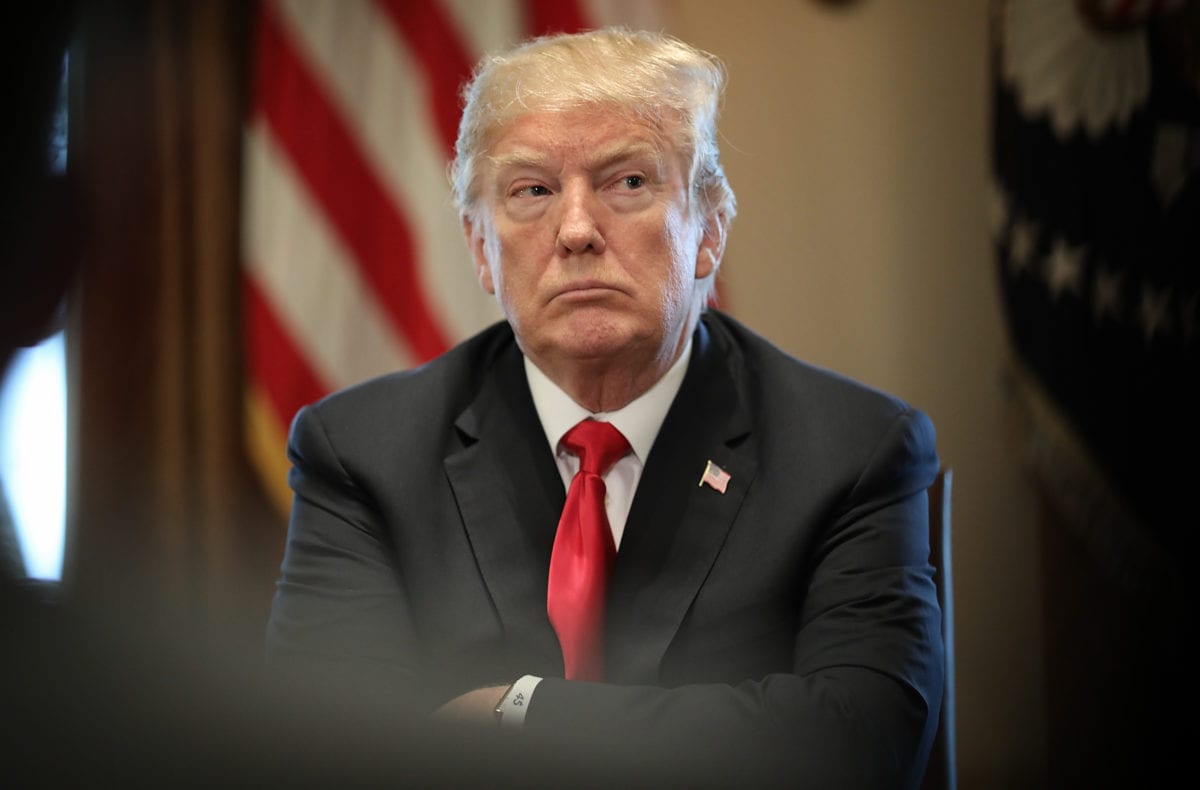
WASHINGTON, DC – U.S. President Donald Trump participates in a meeting with leaders of the steel industry at the White House March 1, 2018 in Washington, D.C. Trump announced planned tariffs on imported steel and aluminum during the meeting, with details to be released at a later date: Win McNamee/Getty Images
ANALYSIS –
By Glynn Wilson –
WASHINGTON, D.C. — President Donald J. Trump’s insistence on fighting a trade war against the entire world all at once for political purposes is on the verge of casting a pall over the global economy that could depress global economic growth and result in the loss of American jobs and big increases in prices for goods. It’s hard to imagine how poor people who voted for Trump will still stand by him when prices on Chinese goods at Wal-mart go through the roof.
While the effects of the trade war will be felt around the country, the impacts will differ by state. In Alabama, South Carolina and Tennessee, for example, which have become competitive in domestic automobile production and the export car and truck market in recent years, a proposed 25-percent tariff on imported automobiles has generated retaliatory tariffs in other countries such as Canada and China and threatens economic progress and jobs in those states.
Alabama’s newest U.S. Senator, Doug Jones, has tried to chart a bipartisan path since coming to Washington to work with a president who was popular in the state and won it’s nine electoral votes handily. But as time goes by he seems to be finding his voice in standing up to some of the president’s more damaging policy proposals.
Senator Jones and other members of Congress from the state have largely remained mum on Trump’s meeting last week with Russia’s Vladimir Putin, a meeting which generated no new deals for the United States and gave some critics even more ammunition to call Trump a traitor who seems guilty of treason for aiding and abetting an enemy of the Unites States.
But Jones took to the Senate floor last week to take on the negative impacts the president’s auto tariffs would have on Alabama and other leading auto-making states in the country, especially in the South. In his remarks, he announced his intention to introduce a bipartisan solution with U.S. Senator Lamar Alexander, a Republican from Tennessee, as early as this week.
Since the tariff proposal was made public, Senator Jones has consistently spoken out against it to protect the tens of thousands of Alabama workers who rely on this industry to support their families, according to a press release on the issue sent out by his staff last week. In June, Senators Jones and Alexander sent a letter to U.S. Department of Commerce Secretary Wilbur Ross to urge him to reconsider the tariff, pointing to the damage it would do to their respective states’ economies.
We broke the news right here: U.S. Senators Doug Jones, Lamar Alexander Push Back on Trump Trade Wars and Tariffs
“Unfortunately, the health of my state’s automobile industry is being threatened not by unfair competition or illegal practices, but by significant tariffs proposed by the president,” Jones said on the Senate floor last week.
“Now let me be clear,” he added. “While the United States faces any number of threats from adversaries on any number of fronts, foreign automobiles and auto parts are not a threat to our national security. But you know what is a threat? A 25-percent tax on the price of these imported goods.”
(See video and full text of comments below).
Meanwhile, according to the New York Times and other news outlets, Trump has plunged the United States into major trade disputes on three fronts: The attempt to renegotiate the North American Free Trade Agreement with Canada and Mexico; a tit-for-tat exchange of tariffs with China; and a fierce backlash from the European Union over recently imposed steel and aluminum tariffs and the prospect of new duties on car and truck imports.
“Mr. Trump has made restructuring trade pacts and reducing America’s trade deficit a central plank of his economic agenda, but his negotiating tactics have angered the country’s allies,” according to the Times.
These issues came up in Buenos Aires, Argentina, this week at a meeting of the Group of 20 finance ministers, who seem baffled at how to deal with Trump’s petty tweets that make no economic sense for the U.S. or the world.
“Growth has been less synchronized recently and downside risks over the short- and medium-term have increased,” according to a communiqué put out by the group. “These include rising financial vulnerabilities, heightened trade and geopolitical tensions, global imbalances, inequality and structurally weak growth, particularly in some advanced economies.”
The International Monetary Fund projected last week that the currently announced tariffs would reduce global economic output by $430 billion, or half a percent, in 2020, if they remained in place and shook investor confidence. It argued that the United States was particularly vulnerable to a slowdown because it would bear the brunt of tariff retaliation from other countries.
“I urged once more that trade conflicts be resolved via international cooperation without resort to exceptional measures,” Christine Lagarde, managing director of the fund, said on Sunday.
“World trade cannot base itself on the law of the jungle, and the unilateral increase of tariffs is the law of the jungle,” said Bruno Le Maire, the French finance minister. “We call on the United States to see sense, to respect the rules of multilateralism and to respect their allies.”
Tariffs on the importation of Canadian goods, for example, just result in an increase in prices on Americans and Canadians. If Mr. Trump levied another round of tariffs, Canada would have no choice but to retaliate again, according to Canada’s finance minister Bill Morneau.
“When other countries place additional tariffs — or new taxes — on American goods, it raises the purchase price of American products overseas and hurts our ability to sustain competitive markets in those countries,” Senator Jones said. “So it is deeply troubling that the recent proposal from the president will threaten tens of thousands of jobs in Alabama and increase costs for American consumers.”
See Speech Video
A full transcript of the Senator’s remarks on the Senate floor:
Mr. President, I rise today to discuss an issue that is of great importance to my constituents in Alabama and many other people across the country.
That issue, Mr. President, is the health of our automotive industry.
Unfortunately, the health of my state’s automobile industry is being threatened not by unfair competition or illegal practices, but by significant tariffs proposed by the President.
According to the U.S. Chamber of Commerce, more than half a million Alabama jobs are supported by global trade – meaning more than one in every four Alabama jobs is tied to trade.
One of the key reasons why Alabama has such a robust trade posture is because of our automotive manufacturing industry.
I’m old enough to remember what it was like before auto companies came into Alabama during the 1990s, starting with Mercedes. At the time Mercedes came, many of Alabama’s manufacturing facilities were closing down, moving to other countries. But one by one – from Mercedes to Honda to Hyundai and now Toyota and Mazda, who are breaking ground on a new plant very soon –these automakers came to Alabama and breathed new life into our state economy.
Today, they support some 57,000 Alabama jobs and our auto exports topped $11 billion in 2017.
That doesn’t even include the new Toyota-Mazda plant in Huntsville, which is going to add another 4,000 jobs and $1.6 billion in economic development.
From having no automobile industry 30 years ago, Alabama has become the third largest exporter of automobiles in the country.
And in just the past 15 months, every major automobile manufacturer in Alabama announced an expansion, totaling 5,400 jobs and $3.3 billion in investments.
This industry has just been a phenomenal success in Alabama and, more importantly, for the men and women who rely on these very good-paying jobs to support their families and build better lives.
That’s why it’s a priority for me and colleagues like my friend Senator Alexander from Tennessee to keep our states’ automotive industries thriving.
But recently, this industry has come under attack.
In May, President Trump threatened a 25-percent tariff on imported cars, trucks, and auto parts – under the pretext that these products somehow threaten our national security.
Now let me be clear – while the United States faces any number of threats from adversaries on any number of fronts, foreign automobiles and auto parts are not a threat to our national security.
But you know what is a threat? A 25-percent tax on the price of these imported goods.
The President’s proposed auto tariffs have the potential to inflict serious damage on a booming industry in my state and other leading auto-producing states, like Tennessee.
We might call them tariffs, but we all know exactly what they are—it’s a tax.
Tariffs, by definition, are a tax on a particular class of imports or exports.
Any tariff placed on a product coming into the United States is a tax that increases the cost of those goods to American consumers.
When other countries place additional tariffs—or new taxes—on American goods, it raises the purchase price of American products overseas and hurts our ability to sustain competitive markets in those countries.
So it is deeply troubling that the recent proposal from the President will threaten tens of thousands of jobs in Alabama and increase costs for American consumers.
Shortly after this tariff threat was issued, Senator Alexander joined me in writing to Commerce Secretary Wilbur Ross urging him to reconsider this auto tariff-tax proposal. Between our two states, the automotive sector contributes more than 200,000 jobs to our economy.
A number of auto workers from our states are in town this week to tell their stories to the Commerce Department first-hand. And I commend them for their efforts in doing so.
Senator Alexander and I understand the devastating blow these tariffs would represent for an industry that has literally rebuilt our respective state economies from [the] ground up.
Automakers and their suppliers can be found in every corner, and in nearly every county, of each of our states.
We have found common cause in fighting these tariffs and protecting our constituents from the devastating impacts they will bring.
There are already a few legislative solutions out there, including Senator Corker’s solution regarding tariffs. I know Senator Portman is also doing a lot of good work in this space. Senator Alexander and I are working together to propose a solution of our own, as a complementary measure, to halt these tariffs.
We hope to introduce that proposal as early as next week, after consulting with our automotive manufacturers and working with our colleagues to grow bipartisan support for this legislation.
I realize that folks affected by these proposed tariffs are looking for a silver bullet to stop them dead in their tracks. Right now, the only silver bullet in this case is for the President to change his mind and recognize how many jobs are at risk because of these proposed tariffs.
Until that happens, we’re going to fight to protect what our states and our workers have earned.
I want to thank my colleague, Senator Alexander, who is here today, for his continued partnership in this effort and I look forward to working with more of our colleagues to stop the urgent threat to American jobs.
Thank you, Mr. President, I yield the floor.













